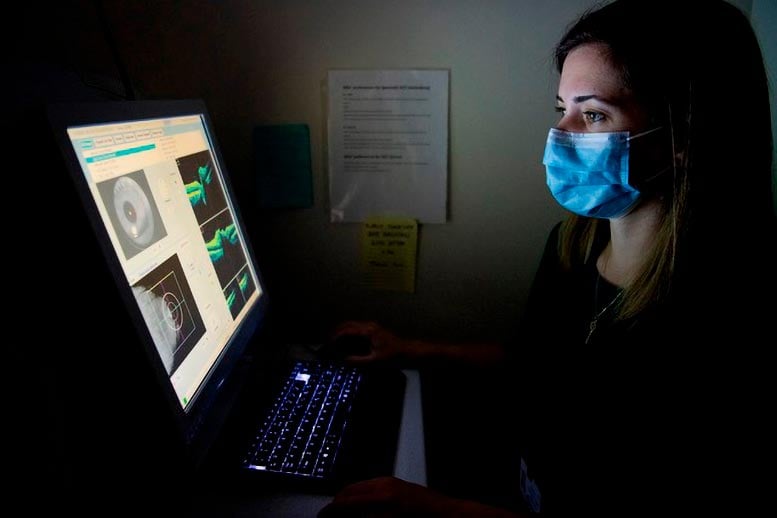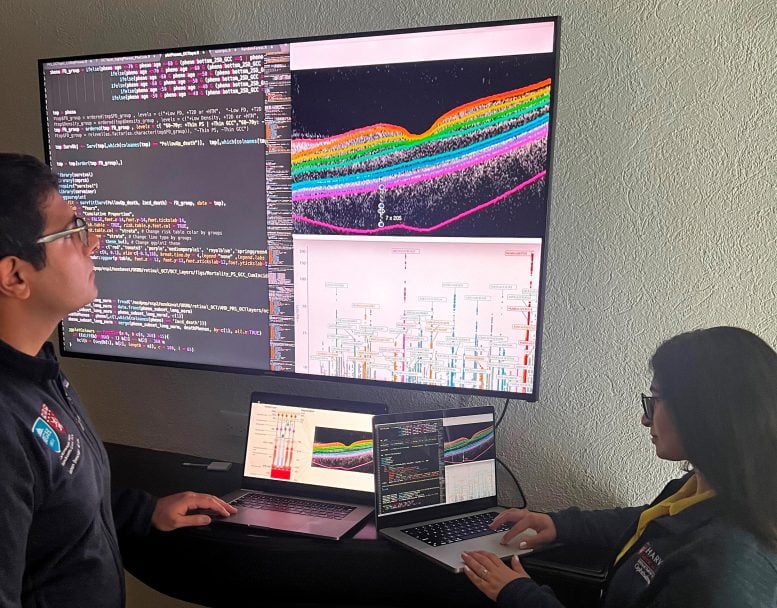- Mass Eye and Ear physician-researchers reveal that retinal imaging can assist forecast an individual’s threat of establishing ocular, neuropsychiatric, heart, metabolic, and lung illness.
- The group likewise recognized hereditary loci connected with retinal thinning, which might assist establish tailored treatment strategies and future treatments for eye illness such as glaucoma and macular degeneration.
The retina is stated to supply a window into an individual’s systemic health. In a brand-new research study released on January 24 th in Science Translational Medication, physician-researchers from Mass Eye and Ear, a member of Mass General Brigham, and the Broad Institute of MIT and Harvard integrated retinal imaging, genes, and huge information to approximate how most likely an individual is to establish eye and systemic illness in the future. They discovered substantial associations in between the thinning of various retinal layers and increased threat of establishing ocular, neuropsychiatric, heart, metabolic, and lung illness and recognized genes that are connected with retinal layer density.
Predictive Power of Retinal Images
” We revealed that retinal images might be utilized to forecast the future threat of both ocular illness and systemic illness,” states initially author Seyedeh Maryam Zekavat, MD, PhD, a Harvard Ophthalmology local at Mass Eye and Ear and college student at Broad. “This might possibly assist with illness avoidance– if we understand from somebody’s retinal image that they are at high threat of establishing glaucoma or heart disease in the future, we might refer them for follow-up screening or preventative treatment.”
Due to the fact that of its position behind the transparent structures of the eye, the retina is simple to envision and image non-invasively, and retinal imaging is currently a regular treatment in ophthalmology. The brand-new research study discovers possibilities for preventative medication and crosstalk in between eye doctors and other locations of medication.
Senior research study author Nazlee Zebardast, MD, MSc, director of Glaucoma Imaging at Mass Eye and Ear, takes a look at OCT images. Credit: Mass Eye and Ear
Connecting Retinal Health With Systemic Conditions
Previous research studies have actually revealed that there are links in between retinal health and health conditions consisting of aging, cardiometabolic illness such as diabetes and high blood pressure, and neurological illness such as dementia, stroke, and several sclerosis.
” We have actually pertained to understand just recently that there is a lot more details that we can receive from our retina images than we believed was possible,” states senior author Nazlee Zebardast, MD, MSc, director of Glaucoma Imaging at Mass Eye and Ear and an assistant teacher of ophthalmology at Harvard Medical School. “It’s truly interesting to be able to see that these images, which are gotten without needing to do any sort of intrusive treatment, are connected with a lot of systemic conditions, both at a hereditary level along with an epidemiologic level.”
To recognize associations in between retinal health and illness threat, and to recognize genes connected with retinal health, the scientists evaluated information from 44,823 UK Biobank individuals who went through optical coherence tomography (OCT) imaging of the retina, genotyping, and standard measurements of health in 2010 and were then followed for illness advancement for approximately 10 years.
Research study co-first authors Drs. Seyedeh Maryam Zekavat and Saman Doroodgar Jorshery analyze information and retinal density images. Credit: Mass Eye and Ear
Insights Into Retinal Layers and Hereditary Associations
Unlike previous research studies that looked for genes connected with total retina health, this research study dove much deeper into the function of the various cell layers that comprise the retina.
” Each layer of the retina is comprised of various kinds of cells with varied structures and functions, and we reveal that the densities of these various layers are connected with various conditions,” states Zebardast, who is likewise an associated researcher at Broad.
The research study likewise offers insight into the genes and biological paths that identify retinal health, which might be leveraged to establish future treatments, the scientists state. Completely, the group recognized 259 hereditary loci that were connected with retinal density.
One specific insight from this work was that several systemic health conditions consisting of bad heart, metabolic, lung, and kidney function are connected to thinning of the photoreceptor section of the retina, though additional research study would be required to verify causality. Future research studies must likewise intend to duplicate the research study’s approaches in more varied populations and various age, given that individuals in the UK BioBank were primarily white and aged 40-70 years of ages at standard.
Broadening Medical Applications and Future Instructions
The research study belongs to a continuous effort at Mass Eye and Ear to recognize hereditary markers of glaucoma and other ocular illness that may assist to establish tailored threat ratings and treatment prepare for clients. Retinal OCT imaging is currently a basic scientific treatment in ophthalmology at Mass Eye and Ear and in other places, however the authors state that their outcomes recommend that its usage might be broadened. Additional deal with the connection in between ocular and cardiometabolic health will make it possible for understanding of its scientific energy, and the scientists are extending this line of research study in addition to co-author Pradeep Natarajan, MD, director of preventive cardiology at Massachusetts General Medical Facility, and an associate member in the Heart disease Effort at Broad.
Conclusion: The Possible of Retinal Imaging in Health Forecast
” Clients pertain to us for their eye health, however what if we could inform them more than that?” states Zebardast. “What if we might utilize somebody’s retinal images to inform them, ‘You appear to have a high threat of having hypertension, possibly you must get evaluated, or possibly your medical care physician must learn about that.'”
The authors have actually established an online user-interface for all of their findings on the Ocular Understanding Website, to make it possible for scientists to check out associations in between retinal layer density, illness, and genes.
Referral: “Phenome- and genome-wide analyses of retinal optical coherence tomography images recognize links in between ocular and systemic health” by Seyedeh Maryam Zekavat, Saman Doroodgar Jorshery, Franziska G. Rauscher, Katrin Horn, Sayuri Sekimitsu, Satoshi Koyama, Trang T. Nguyen, Maria C. Costanzo, Dongkeun Jang, Noël P. Burtt, Andreas Kühnapfel, Yusrah Shweikh, Yixuan Ye, Vineet Raghu, Hongyu Zhao, Marzyeh Ghassemi, Tobias Elze, Ayellet V. Segrè, Janey L. Wiggs, Lucian Del Priore, Markus Scholz, Jay C. Wang, Pradeep Natarajan and Nazlee Zebardast, 24 January 2024, Science Translational Medication
DOI: 10.1126/ scitranslmed.adg4517
Authorship: Seyedeh Maryam Zekavat (MEE, MGH, Broad) Saman Doroodgar Jorshery (Broad) Franziska G. Rauscher (Lepzig), Katrin Horn (Leipzig), Sayuri Sekimitsu (Tufts) Satoshi Koyama (MGH, Broad) Trang T. Nguyen (Broad) Maria C. Costanzo (Broad), Dongkeun Jang (Broad), Noël P. Burtt (Broad), Andreas Kühnapfel (Leipzig) Yusrah Shweikh (MEE), Yixuan Ye (Yale), Vineet Raghu (MGH, Broad), Hongyu Zhao (Yale), Marzyeh Ghassemi (Toronto), Tobias Elze (MEE), Ayellet V. Segrè (MEE), Janey L. Wiggs (MEE), Lucian Del Priore (Yale), Markus Scholz (Leipzig), Jay C. Wang (Yale) Pradeep Natarajan (MGH, Broad) Nazlee Zebardast (MEE, Broad).

